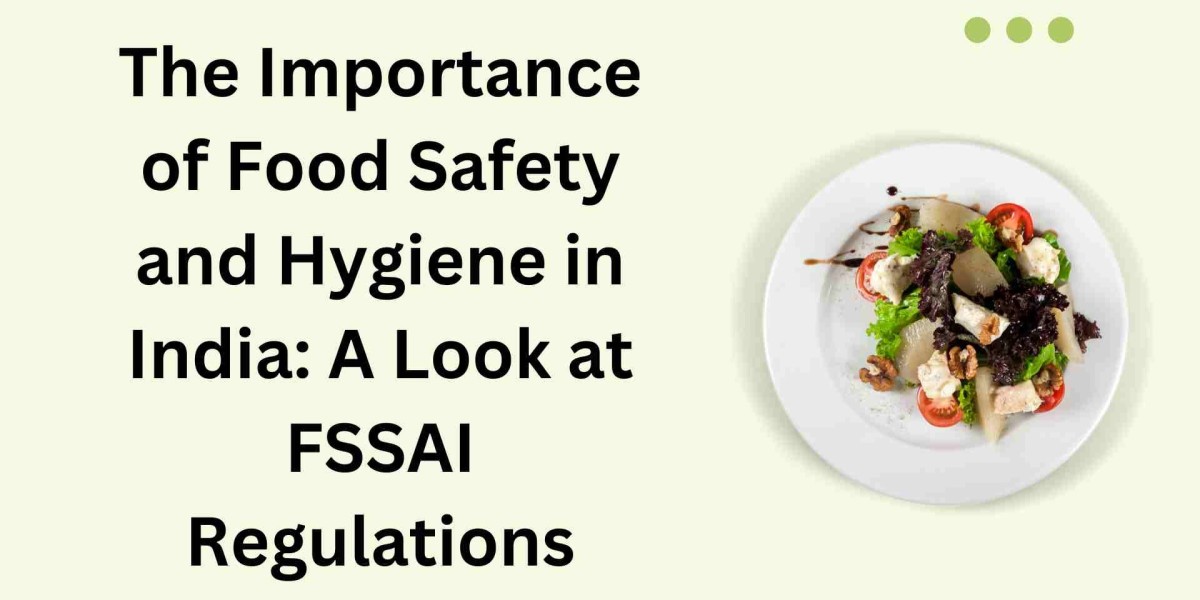A food license, often referred to as a food license or food business license, is a legal document or permit that is required for individuals or entities involved in the production, storage, distribution, or sale of food products. These licenses are typically issued by relevant government authorities, such as the Food Safety and Standards Authority of India (FSSAI) in India.
Food safety and hygiene are critical aspects of public health in India. The Food Safety and Standards Authority of India (FSSAI) plays a pivotal role in ensuring that the food consumed by the Indian population adheres to stringent safety standards. In this article, we'll delve into the significance of food safety and hygiene in India and explore the essential regulations set forth by FSSAI LICENSE to maintain these standards.
The Significance of Food Safety and Hygiene:
Food safety and hygiene are not just buzzwords but fundamental prerequisites for a healthy population. Poor food safety practices can lead to a range of foodborne illnesses, including food poisoning, bacterial infections, and more severe health issues. These illnesses not only affect individual health but can lead to significant public health crises, affecting large numbers of people.
The FSSAI, established under the Food Safety and Standards Act, of 2006, is responsible for regulating and supervising the safety of food products in India. Its primary goal is to safeguard public health and ensure that food products are free from contaminants, impurities, and any potential hazards.
FSSAI Regulations: Ensuring Food Safety and Hygiene
FSSAI regulations cover a wide array of areas to ensure food safety and hygiene in India:
Licensing and Registration:
FSSAI mandates that food businesses, ranging from small eateries to large food processing units, acquire the appropriate license or registration to operate legally. This process involves an assessment of the business's infrastructure, quality control measures, and adherence to hygiene standards.
Food Standards:
FSSAI sets comprehensive food standards to regulate the composition, quality, and labeling of food products. These standards ensure that the food products available in the market meet the required safety and quality levels.
Hygiene and Sanitation:
FSSAI places significant emphasis on the hygiene and sanitation practices within food establishments. This includes guidelines for maintaining clean premises, proper waste disposal, and training of staff in food safety practices.
Food Testing and Inspection:
FSSAI regularly conducts food testing and inspections to identify and rectify safety issues. This proactive approach helps in preventing contaminated or adulterated food from reaching consumers.
Consumer Awareness:
FSSAI also works to educate consumers about food safety and hygiene through various campaigns and initiatives. Informed consumers play a crucial role in demanding safe food products.
Challenges and Achievements: Navigating Food Safety in India
While FSSAI regulations have made significant strides in ensuring food safety and hygiene, there are challenges that need to be addressed. The vast and diverse food industry in India presents unique hurdles:
Informal Sector:
A substantial portion of India's food industry operates within the informal sector, which may lack the resources and awareness to meet FSSAI standards. Bridging this gap and extending FSSAI's reach to smaller businesses is an ongoing challenge.
Foodborne Illnesses:
Despite FSSAI's efforts, foodborne illnesses remain a concern in India. Contamination, poor handling, and inadequate storage can still lead to health risks.
You can also food license renewal
Counterfeit Products:
The presence of counterfeit food products is another issue. FSSAI is constantly working to curb the availability of substandard and adulterated food in the market.
However, FSSAI has also achieved remarkable success. The "Eat Right India" campaign, launched by FSSAI, has been instrumental in promoting food safety and encouraging a balanced diet. Food businesses are increasingly recognizing the value of obtaining FSSAI certification, not only for compliance but also as a mark of quality.
The organization's digital initiatives, such as the "FSSAI-1 FoSCoRIS," have made it easier for businesses to apply for licenses and consumers to access information about the safety of food products. Moreover, FSSAI's continuous effort to update and refine food safety standards aligned with global best practices, contributed to India's emergence as a safe and reliable source of food products.
Conclusion:
The importance of food safety and hygiene in India cannot be overstated. FSSAI's regulations and efforts are indispensable in maintaining high standards of food safety, protecting public health, and ensuring that consumers can enjoy the diverse culinary delights of the country without risking their well-being. By adhering to FSSAI regulations and fostering a culture of food safety and hygiene, India can continue to thrive as a hub of gastronomic excellence while safeguarding the health and well-being of its people.








